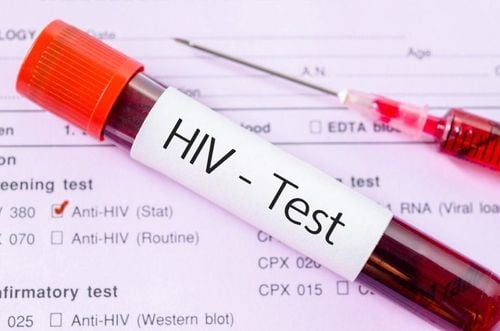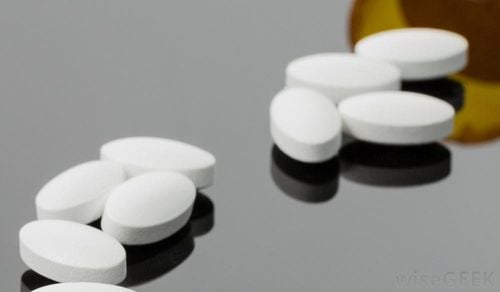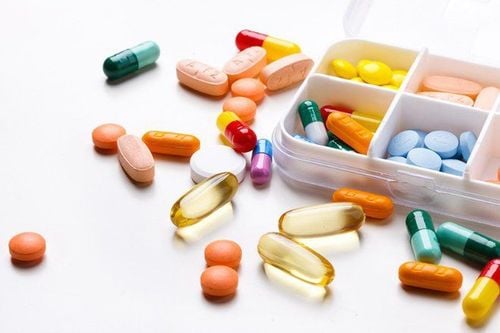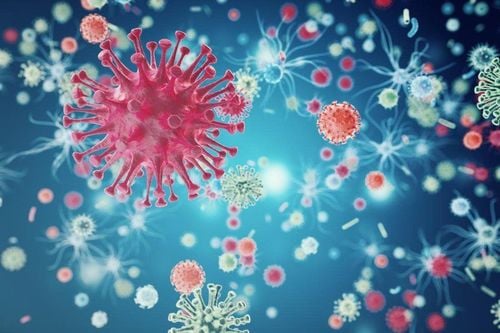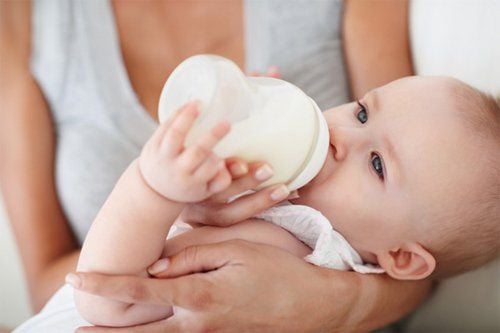This is an automatically translated article.
Diagnosis of HIV in children under 18 months is made with subjects who are HIV-exposed children (children born to HIV-infected mothers), children with suspected HIV infection or with clinical symptoms of HIV infection. and have a positive anti-HIV antibody test result.
1. What is the HIV diagnostic test in children under 18 months?
Perform PCR test to detect HIV nucleic acid (RNA/DNA) to confirm HIV infection in infants and children under 18 months of age; The time for PCR testing for babies born to HIV-infected mothers is when the baby is 4-6 weeks old, or during the first visit at an HIV care and treatment facility.
2. Procedures for performing HIV diagnostic tests in infants
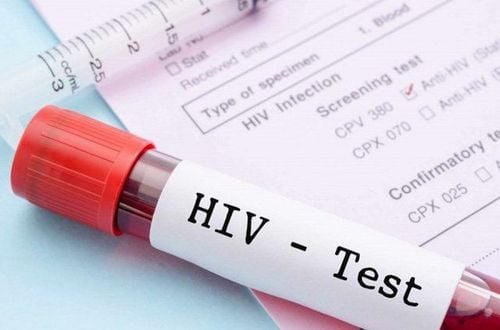
Xét nghiệm HIV ở trẻ sơ sinh cho trẻ bị phơi nhiễm là vô cùng quan trọng
2.1 HIV testing in exposed infants under 9 months of age Get the DBS sample for the first PCR test at 4-6 weeks of age or as soon as possible after this period; If the first PCR test result is positive, start ART. Then, redo the PCR test on the stored DBS samples, or retake the DBS sample for PCR testing if necessary - when the first PCR test is positive and the second is negative; If the first PCR test result is negative, to diagnose HIV in the newborn, it is necessary to monitor the following 2 cases: For the child who has never been breastfed, it is possible that the child is not infected with HIV. However, it is necessary to do an anti-HIV antibody test when the child is 12-18 months old to confirm; For children who have been breastfed or are currently breastfed, the child is still at risk of HIV infection, so further monitoring is needed: If the child has signs or symptoms that suggest HIV infection, conduct a PCR test on the child. Children under 9 months of age or anti-HIV antibody test for children ≥ 9 months of age and start ART immediately. If the PCR result is positive, a repeat PCR test should be taken to confirm HIV infection in the neonate. In case the PCR result is negative, the HIV antibody test should be repeated when the child is 12-18 months old. If the child is healthy and develops normally, an anti-HIV antibody test should be performed when the child is 9 months old or after weaning. With negative results, repeat the HIV antibody test when the child is 12-18 months old to confirm and diagnose HIV infection in children under 18 months. With a positive result, it is necessary to immediately treat the child with ARV if the child is clinically diagnosed with severe HIV/AIDS disease, and at the same time do PCR test. 2.2 HIV testing in exposed infants 9 - 18 months of age For HIV-exposed children between 9 and 18 months of age and children with suspected HIV infection under 18 months of age, an antibody screening test will be indicated prior HIV resistance; If the HIV antibody test result is positive, it is necessary to immediately treat the child with ARV in case the child is clinically diagnosed with severe HIV/AIDS disease, and at the same time do PCR test; If the HIV antibody test result is negative, then the mother is tested for anti-HIV antibody, if the mother's test result is negative, the baby is not infected with HIV. It is necessary to monitor the following 2 cases: For children who have never been breastfed, they are not infected with HIV; For children who have been breastfed or are currently breastfed, the child is still at risk of HIV infection, therefore, it is necessary to monitor the child: If the child shows signs or symptoms of HIV infection, take a test. PCR if the child is less than 9 months old or anti-HIV antibody test. If the results are negative, do a test to detect HIV antibodies when the child is 12-18 months old to confirm the diagnosis of HIV in children under 18 months. If the result is positive, immediately treat the child with ARV if the child is clinically diagnosed with severe HIV/AIDS disease, and at the same time do PCR test; If the child is healthy and develops normally, an anti-HIV antibody test should be performed when the child is 9 months old or after weaning. If the result is negative, repeat the HIV antibody test when the child is 12-18 months old to confirm; if the result is positive, then immediately treat the child with ARV if the child is clinically diagnosed with severe HIV/AIDS disease, and at the same time do PCR test.
3. Interpretation of HIV diagnostic test results in children under 18 months

Bác sĩ sẽ giải thích cho cha mẹ hiểu rõ quy trình xét nghiệm chẩn đoán HIV
Negative 1st PCR test result: If the child is not breastfed or has stopped breastfeeding completely 6 weeks before the PCR test, the child is more likely not to be infected with HIV, the family continues to monitor. To diagnose HIV in children under 18 months, it is necessary to do an anti-HIV antibody test for the child when the child is 12-18 months old. If the child is under 18 months old and has a positive anti-HIV antibody test, the test should be repeated when the child is 18 months old; If the baby is breastfed or has stopped breastfeeding for less than 6 weeks, the baby is most likely not infected with HIV, but the baby is still at risk of HIV infection through breast milk, so the family needs to continue to monitor. To diagnose HIV in children under 18 months, the test should be repeated 6 weeks after the baby is weaned completely before PCR testing. The first PCR test result is positive: The child needs a second blood sample to confirm the test and needs ART immediately for the child. Besides, it is also necessary to do HIV test for the child's parents if they do not know the HIV status; The second PCR test result is positive: confirm the HIV infection status of the child, so it is necessary to continue treatment with ARV; The first PCR test result is positive and the second time is negative: it cannot be confirmed, so it is necessary to continue to monitor the child and do the third PCR test to determine HIV infection status; Both the first and second PCR results were positive, confirming HIV infection. Therefore, it is not necessary to do an anti-HIV antibody test when the child is 18 months old, but to carry out long-term continuous antiretroviral therapy. Diagnosis of HIV in children under 18 months helps early detection and effective HIV treatment. Parents need to understand the HIV diagnostic test process to fully comply, help bring accurate results about the child's disease status, and have appropriate treatment.
Please dial HOTLINE for more information or register for an appointment HERE. Download MyVinmec app to make appointments faster and to manage your bookings easily.
Reference source: Guidance document of the Ministry of Health



